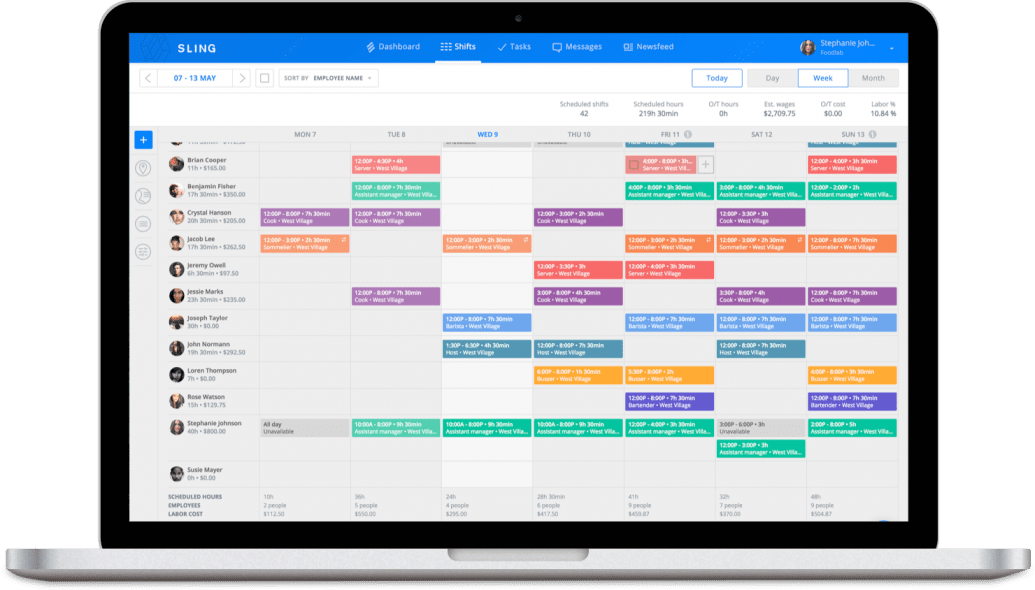The 37 Best Restaurant Interview Questions
Discover 37 restaurant interview questions that help you avoid the canned answe...

The retail interview questions you ask during a face-to-face interview can mean the difference between finding the best employee for the job and getting stuck with someone who’s just there for the paycheck.
To help you really get to know your potential new-hire, the experts at Sling have created a list of the 11 best retail interview questions for your business. These questions make the interview process easier, help you avoid the “stock” answers, and reveal the candidate’s true potential.

Asking the candidate why they want to work in your retail business gives you insight into their motives. If they say they really enjoy interacting with customers, that’s a good sign. If they tell you your business pays the highest entry-level wage, that’s a bad sign.
The candidate’s answer to this question should indicate some prior knowledge of your business. And it doesn’t matter if that knowledge is gained through research or first-hand experience.
Any detailed response reveals that the potential hire likes what you have to offer and is motivated to be a part of it.
Every team has its own unique work style. Whether you created that style yourself or it developed naturally over time, you want any new hire to gel with the existing team.
This question gives you a feel for the person underneath — whether they work better on their own or in a collaborative setting — and reveals where and how they might fit into the current team dynamic.

Being a part of a successful team means leading and following as necessary — and being able to step up to work in whatever capacity is needed for the betterment of the business.
An answer that reflects this team ideal can help you determine whether the candidate is right for your business.
It’s best to ask this question up front, before you hire someone who carries a grudge or a negative prejudice.
You don’t want to find out six months down the line that your new employee has a problem with a certain sex, race, culture, or personality type.
With this question, you’re looking for an honest answer — both in what they say and in how they say it.
The weakness your candidate gives shouldn’t be a key skill of the retail industry. Neither should the answer feel disingenuous, as if the candidate just made something up for the purposes of the interview.
If you need more information about the interviewee’s answer, don’t be afraid to ask a follow-up question like, “What are you doing to improve that weakness?”
With this question, you want to find out what the candidate has to offer your business and if their skills connect with your goals for the position.
Of course, acceptable answers should be relevant to the retail industry — “I’m good at coding” is irrelevant to this situation — but don’t dismiss fringe strengths like being focused or calm under pressure. They might be just the abilities you need to create a well-rounded team.
Customer service is an essential part of the retail business. So the way your potential new-hire views this all-important skill will give you insight into their behavior should you give them the job.
Take the time to dig deeper with follow-up questions if the first answer they give doesn’t satisfy your expectations.
No matter how hard you work to prevent them, there are going to be conflicts between coworkers. These conflicts can quickly spill out onto the sales floor, where they can affect the customer experience (usually for the worse).
Asking how the potential new-hire deals with those conflicts — whether they are involved or not — reveals their maturity level, how they handle stress, and how they tackle interpersonal problems.
You don’t have to ask this specific question (return an item without tags) if it’s not particularly germane to your niche. But asking some form of the “How would you handle…” question can be extremely indicative of whether or not the candidate will fit well in your business model.
You should already have a policy for whatever issue you ask about outlined in your employee handbook, but the answer the candidate gives can be a great indicator of how they will behave in other stressful situations.
Good answers to this question shouldn’t be things like advancement, prestige, or money. Instead, you want to hear a definition of success that applies to your team or to your business as a whole.

The face-to-face interview is a vital step in finding the best hire for your business. Don’t shortchange yourself — and the interviewee — by rushing through the interview in 15 or 20 minutes.
Schedule at least 45 minutes (an hour is better) so you can ask enough retail interview questions to really get to know your potential team member.
If scheduling is a problem in your business — or if you just want the quickest and easiest way to schedule your daily activities and the daily activities of your team — try the Sling app right now for free.

Additionally, if you’re worried about spending too much time on any one question, here’s a basic time allocation for a 60-minute interview:
With those metrics in mind, you can ask anywhere from seven to 11 retail interview questions and still have plenty of time for thorough answers.
The more you get to know about your potential hire the better you’ll be able to tell if they’re really right for the job. That will have a very positive effect on the way your team works and the success of your business.
For more free resources to help you manage your business better, organize and schedule your team, and track and calculate labor costs, visit GetSling.com today.
See Here For Last Updated Dates: Link
This content is for informational purposes and is not intended as legal, tax, HR, or any other professional advice. Please contact an attorney or other professional for specific advice.
Schedule faster, communicate better, get things done.